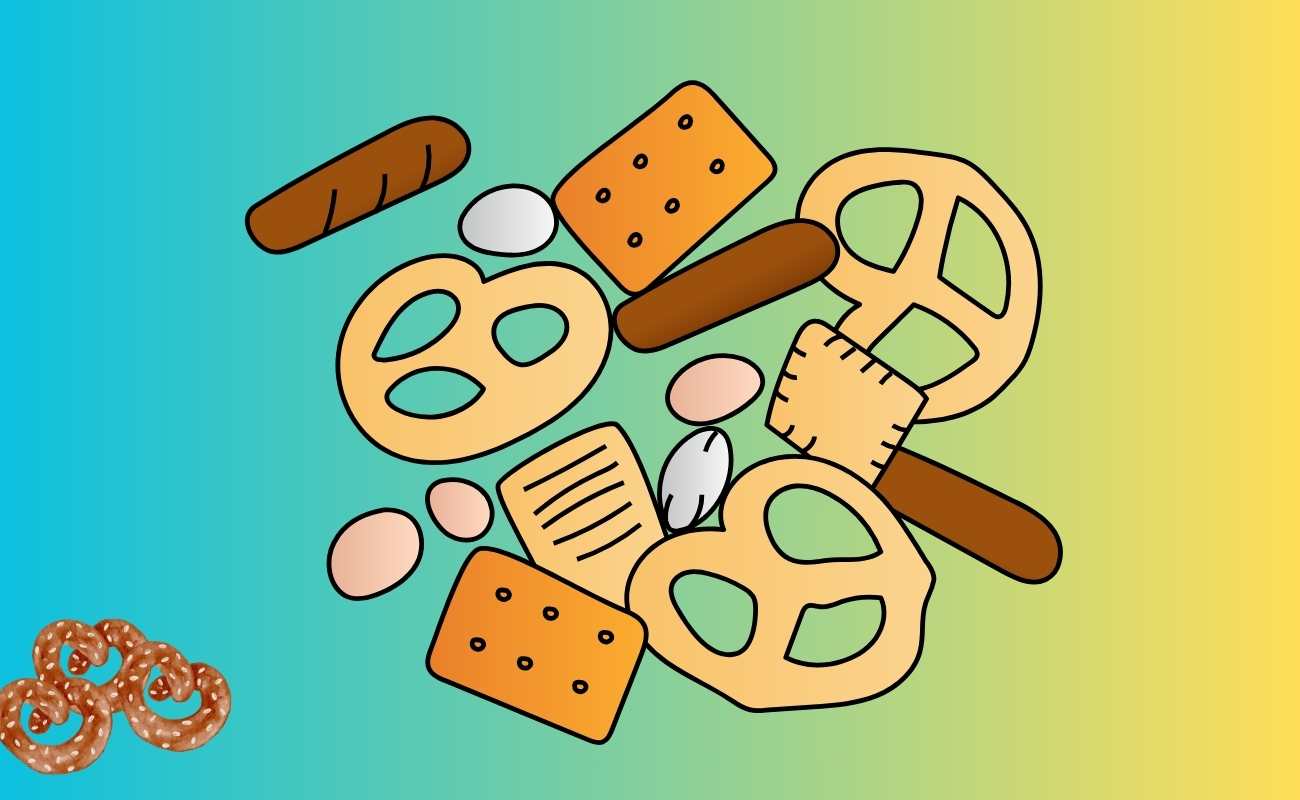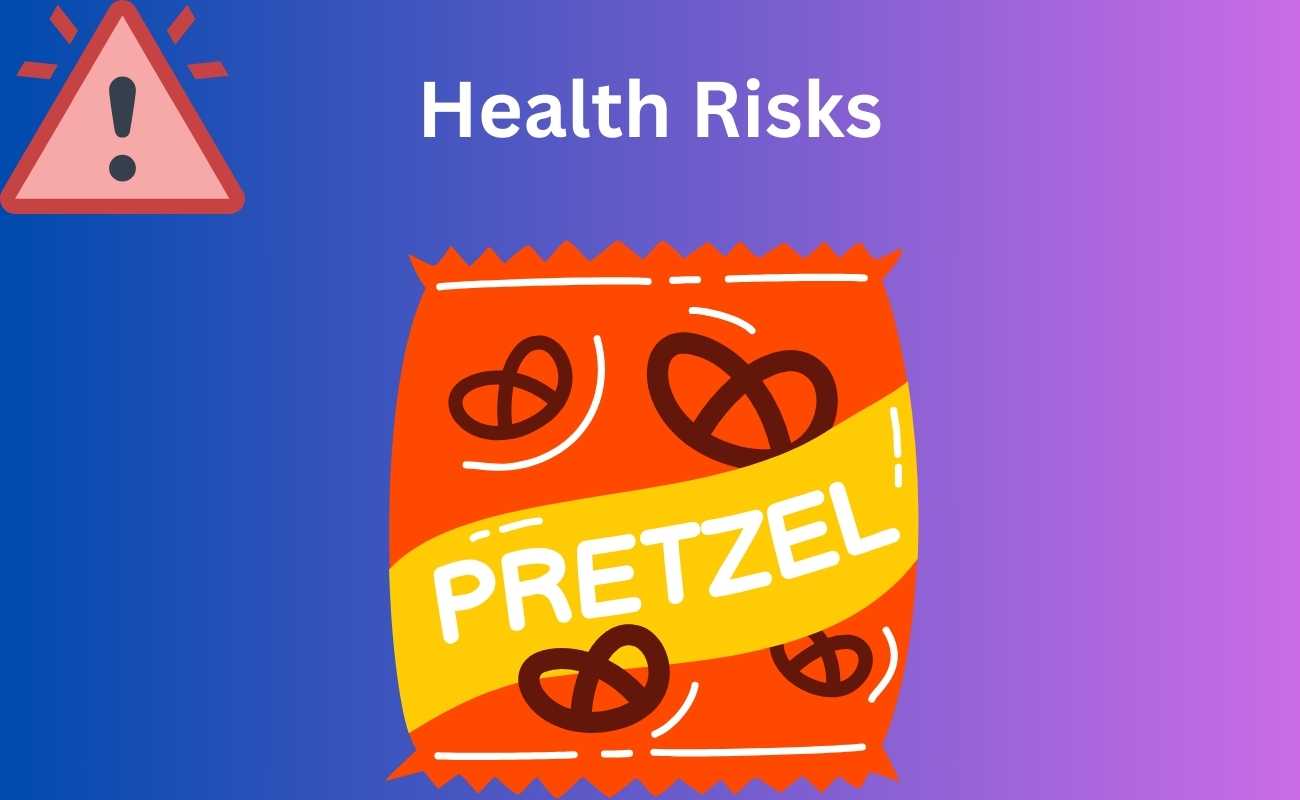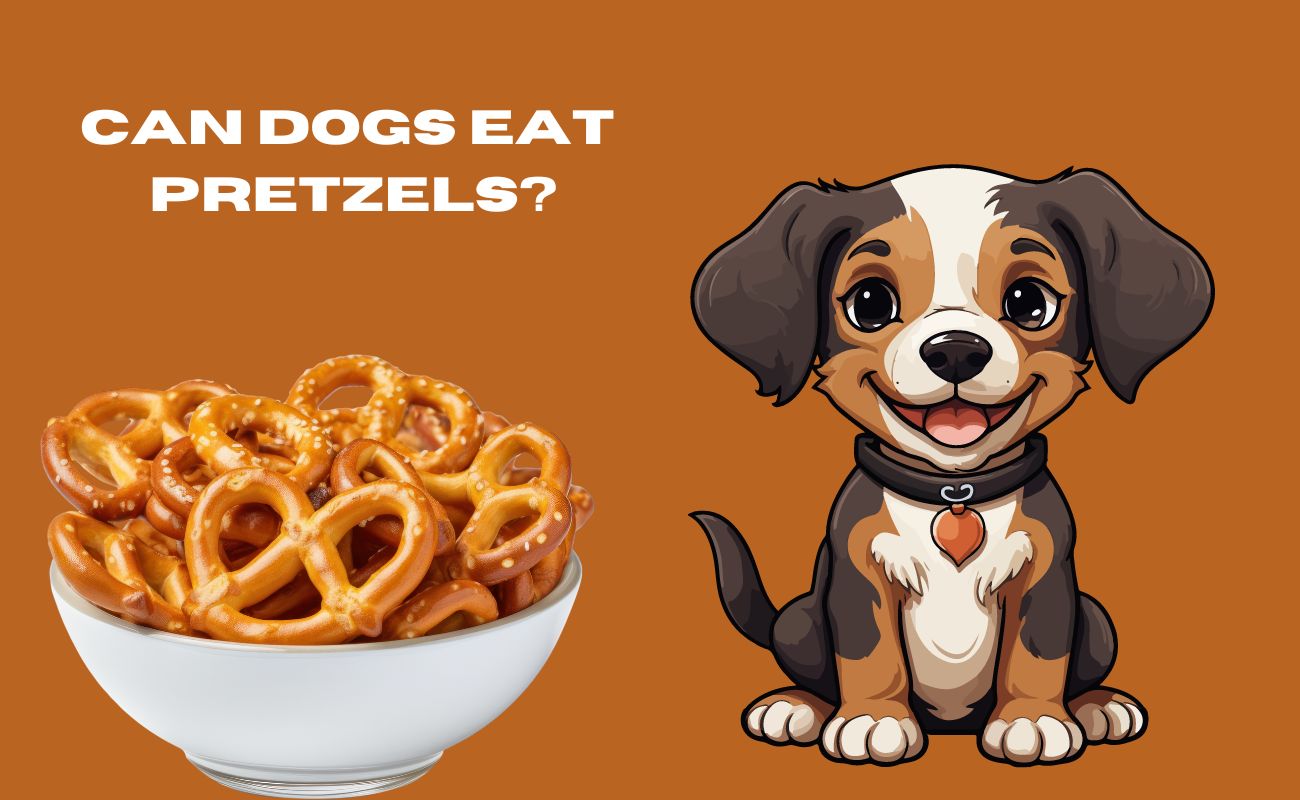As pet owners, it’s natural to want to share our favorite snacks with our furry friends. Pretzels, with their crunchy texture and salty flavor, might seem like a harmless treat to share with your dog. But before you toss a pretzel to your pup, it’s essential to understand whether pretzels are safe for dogs and what the potential risks might be.
This comprehensive guide will explore everything you need to know about pretzels and dogs, including the ingredients in pretzels, the health risks, possible benefits, and safe alternatives for treating your dog.

What Are Pretzels Made Of?
To understand whether pretzels are safe for dogs, it’s important to first break down the ingredients commonly found in pretzels. Pretzels are typically made from a simple combination of ingredients, including wheat flour, water, yeast, and salt.
Some varieties may also contain sugar, fat, and various seasonings like garlic, onion, or cheese. Let’s take a closer look at these ingredients and their implications for your dog’s health.
1. Wheat Flour:
Wheat flour is the primary ingredient in most pretzels, providing the bulk of the dough. While wheat flour is generally safe for dogs, some dogs may have allergies or sensitivities to wheat or gluten. If your dog has a known wheat allergy, it’s best to avoid giving them pretzels.
2. Salt:
Salt is a key ingredient in pretzels, giving them their distinctive flavor. However, while salt is an essential nutrient for dogs in small amounts, too much salt can be harmful. Excessive salt intake can lead to sodium ion poisoning, which can be life-threatening.
3. Sugar and Fat:
Some pretzels, especially soft pretzels, may contain added sugar and fat. While these ingredients aren’t necessarily toxic to dogs, they can contribute to weight gain, obesity, and other health issues if consumed in large amounts.
4. Flavorings and Additives:
Many pretzels are flavored with seasonings like garlic, onion, cheese, or various spices. Garlic and onion, in particular, are toxic to dogs and can cause serious health problems, including anemia. Additionally, some pretzels may contain artificial sweeteners like xylitol, which is extremely toxic to dogs.
Understanding the ingredients in pretzels is the first step in determining whether they are safe for your dog. Now, let’s explore the potential health risks associated with giving pretzels to dogs.
Nutritional Value Chart:
Here’s a chart outlining the general nutritional values for pretzels. Please note that the values can vary depending on the brand and specific type of pretzel. The following values are based on a standard serving size of 1 ounce (28 grams) of plain, hard pretzels.
| Nutrient | Amount per 1 oz (28g) | Health Implications for Dogs |
|---|---|---|
| Calories | 110 kcal | Contributes to weight gain if consumed regularly. |
| Carbohydrates | 23 g | Can cause digestive issues in large quantities. |
| Sugar | 0.5 g | Minimal, but excess can lead to obesity. |
| Dietary Fiber | 1 g | Generally safe but provides little benefit. |
| Protein | 2 g | Safe, but not a significant source for dogs. |
| Fat | 1 g | Low, but unnecessary fat intake should be avoided. |
| Sodium | 450 mg | High; can cause sodium ion poisoning in dogs. |
| Iron | 1.5 mg | Safe in small amounts; excessive intake is harmful. |
This chart provides a quick overview of the nutritional content in pretzels and how each component might affect your dog. It’s a helpful tool to understand why pretzels aren’t the best choice for a canine snack.

Health Risks of Pretzels for Dogs
While pretzels might seem like a harmless snack, they can pose several health risks to dogs, especially when consumed in large quantities or when flavored with toxic ingredients. Here are some of the main health risks to consider:
1. High Salt Content:
One of the most significant risks associated with pretzels is their high salt content. Dogs don’t need as much salt as humans do, and too much salt can lead to sodium ion poisoning. Symptoms of salt poisoning include vomiting, diarrhea, excessive thirst, frequent urination, lethargy, tremors, seizures, and, in severe cases, death. Even a small amount of salt can be harmful to dogs, especially small breeds or those with underlying health conditions.
2. Carbohydrates and Calories:
Pretzels are high in carbohydrates and calories, which can contribute to weight gain and obesity if consumed regularly. While dogs do need some carbohydrates in their diet, they should come from healthy sources like fruits and vegetables rather than processed snacks like pretzels. Additionally, dogs that consume too many carbs may experience digestive issues such as bloating, gas, or diarrhea.
3. Additives and Seasonings:
As mentioned earlier, many pretzels are flavored with additives and seasonings that can be harmful to dogs. Garlic and onion are toxic to dogs and can cause anemia, a condition in which the red blood cells are destroyed, leading to weakness, lethargy, and other serious health problems. Cheese-flavored pretzels may contain high levels of fat, which can lead to pancreatitis, a painful and potentially life-threatening condition. Artificial sweeteners like xylitol are extremely toxic to dogs and can cause a rapid insulin release, leading to hypoglycemia (low blood sugar), seizures, liver failure, and death.
4. Choking Hazard:
Pretzels, especially hard pretzels, can be a choking hazard for dogs, particularly small breeds or those that tend to gulp their food without chewing. If a pretzel becomes lodged in your dog’s throat, it can cause choking or blockages in the digestive tract, requiring emergency veterinary care.
Given these potential health risks, it’s clear that pretzels are not an ideal treat for dogs. However, are there any circumstances under which pretzels might be safe for dogs? Let’s explore the possible benefits of pretzels for dogs and when they might be okay as an occasional treat.
Possible Benefits of Pretzels for Dogs
While pretzels are generally not recommended as a regular treat for dogs, there may be some situations in which a plain, unsalted pretzel could be considered safe for your dog. However, it’s important to understand that the benefits are minimal, and there are much better options available for treating your dog.
1. Plain, Unsalted Pretzels as an Occasional Treat:
If you have a plain, unsalted pretzel with no added seasonings or artificial sweeteners, it may be safe to give your dog a small piece as an occasional treat. However, it’s important to emphasize that this should be a rare occurrence and not a regular part of your dog’s diet. Pretzels don’t offer any significant nutritional benefits for dogs and are mostly empty calories that can contribute to weight gain.
2. Crunchy Texture:
Dogs often enjoy crunchy treats, and the texture of a pretzel might be appealing to them. However, there are plenty of dog-specific treats that provide a satisfying crunch without the risks associated with pretzels. These treats are formulated with your dog’s health in mind and offer balanced nutrition.
3. Better Treat Alternatives:
Instead of giving your dog pretzels, consider offering treats that are specifically made for dogs. These treats are designed to meet your dog’s nutritional needs and come in a variety of flavors and textures that your dog will love. Additionally, you can make your own homemade dog treats using simple, dog-safe ingredients like oats, peanut butter (without xylitol), and pumpkin.
While plain, unsalted pretzels might not be immediately harmful to your dog, they don’t provide any real benefits and can pose serious risks if consumed in large quantities or with added seasonings. It’s always better to choose healthier alternatives that are safe and nutritious for your dog.
Signs Your Dog Has Eaten Too Many Pretzels
If your dog has gotten into a bag of pretzels or you’ve accidentally given them more than a small piece, it’s important to watch for signs of potential health issues. Here are some symptoms to watch for and steps to take if you suspect your dog has eaten too many pretzels:
1. Symptoms of Salt Poisoning:
Salt poisoning is one of the most serious risks associated with pretzels. If your dog has consumed too much salt, they may exhibit symptoms such as:
- Excessive thirst and frequent urination
- Vomiting and diarrhea
- Lethargy and lack of coordination
- Tremors or seizures
If you notice any of these symptoms, it’s crucial to contact your veterinarian immediately. Salt poisoning can be life-threatening, and prompt treatment is essential.
2. Digestive Upset:
Even if your dog doesn’t experience salt poisoning, they may still suffer from digestive upset after eating pretzels. Symptoms to watch for include bloating, gas, diarrhea, or constipation. If your dog is experiencing digestive issues, try to keep them comfortable and provide plenty of fresh water. If symptoms persist or worsen, consult your veterinarian.
3. Choking or Blockages:
If your dog has swallowed a large piece of pretzel without chewing, there is a risk of choking or blockages in the digestive tract. If your dog is coughing, gagging, or showing signs of distress, seek veterinary care immediately. In some cases, your vet may advise inducing vomiting to remove the pretzel from your dog’s stomach, but this should only be done under veterinary guidance.
4. Monitoring Your Dog:
After your dog has eaten pretzels, it’s important to monitor them closely for the next 24-48 hours. Watch for any signs of illness or discomfort, and be prepared to seek veterinary care if needed. If your dog has eaten pretzels with toxic ingredients like garlic, onion, or xylitol, seek emergency veterinary care immediately.
Being aware of the potential risks and symptoms associated with pretzels can help you take swift action if your dog consumes them. However, the best approach is to avoid giving your dog pretzels altogether and choose safer, healthier alternatives.
Safe Alternatives to Pretzels
While pretzels may not be the best choice for your dog, there are plenty of safe and healthy alternatives that your dog will love just as much. Here are some dog-friendly snacks and treats that you can offer instead of pretzels:
1. Healthy Dog-Friendly Snacks:
- Fruits and Vegetables:
Many fruits and vegetables are safe for dogs and make great crunchy snacks. Carrots, apple slices (without seeds), green beans, and cucumber slices are all healthy options that provide vitamins, minerals, and fiber. Just be sure to avoid fruits and vegetables that are toxic to dogs, such as grapes, raisins, and onions. - Dog-Specific Treats:
There are countless dog-specific treats available on the market, ranging from crunchy biscuits to soft chews. These treats are formulated to meet your dog’s nutritional needs and come in a variety of flavors that your dog will enjoy. Look for treats made with high-quality ingredients and free from artificial additives.
2. Homemade Dog Treats:
If you enjoy baking, making your own dog treats can be a fun and rewarding way to provide your dog with healthy snacks. Here are a couple of simple homemade dog treat recipes that are safe and delicious:
- Simple Dog Biscuits:
Ingredients:- 2 cups whole wheat flour (or a gluten-free alternative)
- 1/2 cup unsweetened applesauce or mashed banana
- 1/4 cup peanut butter (ensure it does not contain xylitol)
- 1 egg
Instructions:
- Preheat your oven to 350°F (175°C).
- In a mixing bowl, combine the flour, applesauce (or banana), peanut butter, and egg.
- Mix until a dough forms.
- Roll out the dough on a floured surface to about 1/4 inch thickness.
- Use cookie cutters to cut out shapes, and place them on a baking sheet lined with parchment paper.
- Bake for 20-25 minutes or until the biscuits are golden brown.
- Let the biscuits cool completely before giving them to your dog.
- Frozen Yogurt Treats:
Ingredients:- 1 cup plain, unsweetened yogurt (avoid yogurt with artificial sweeteners)
- 1/2 cup pureed pumpkin or mashed banana
- 1 tablespoon peanut butter (ensure it does not contain xylitol)
Instructions:
- In a mixing bowl, combine the yogurt, pureed pumpkin (or banana), and peanut butter.
- Mix until smooth.
- Spoon the mixture into silicone molds or ice cube trays.
- Freeze for at least 2 hours or until solid.
- Pop the frozen treats out of the molds and store them in an airtight container in the freezer.
- Serve as a refreshing treat on a hot day.
3. Why These Alternatives Are Better:
- Balanced Nutrition:
Dog-specific treats and healthy snacks provide essential nutrients without the risks associated with human foods like pretzels. These alternatives are designed to support your dog’s overall health and well-being. - Avoiding Harmful Ingredients:
By sticking to dog-safe ingredients, you can avoid the risks of sodium toxicity, digestive issues, and exposure to toxic substances like xylitol, garlic, or onion. Homemade treats also give you control over what goes into your dog’s snacks, ensuring they are free from harmful additives.
Choosing safe and healthy alternatives to pretzels not only protects your dog’s health but also allows you to indulge your pet with treats that are both delicious and nutritious.
Conclusion
While it may be tempting to share your pretzels with your dog, it’s important to remember that not all human foods are safe for pets. Pretzels, with their high salt content and potential for harmful additives, are not the best choice for dogs. Even plain, unsalted pretzels offer little nutritional value and can contribute to weight gain and other health issues if consumed regularly.
Instead of giving your dog pretzels, consider offering healthier alternatives like fruits, vegetables, dog-specific treats, or homemade dog snacks. These options provide the crunch and flavor your dog loves without the risks associated with pretzels.
If your dog does happen to eat pretzels, monitor them closely for any signs of illness or discomfort and seek veterinary care if needed. It’s always better to err on the side of caution when it comes to your dog’s diet.
In conclusion, when it comes to treating your dog, prioritize their health and well-being by choosing safe, nutritious options that are specifically designed for dogs. By doing so, you’ll ensure that your furry friend stays happy, healthy, and by your side for years to come.






